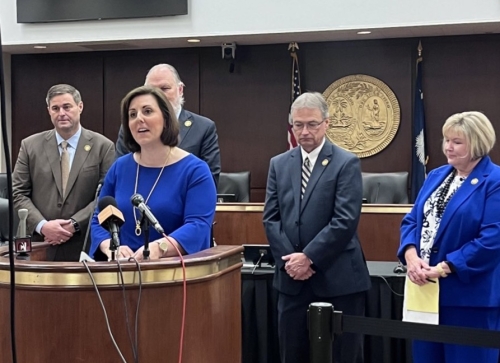Universal School Choice is Coming!
Have you heard the news? South Carolina is on its way to universal school choice!
Like we said after the full repeal of South Carolina’s restrictive Certificate of Need law, it is time to say goodbye to incrementalism! We wrote then that, “if the South Carolina legislature is willing to listen to citizens and patients first and foremost, the sky is the limit for reforms across the board.”
Now, we are seeing that hope come to fruition in the realm of educational freedom, with the filing of H. 5164, which seeks to expand South Carolina’s new education scholarship account (ESA) program, the Education Scholarship Trust Fund (ESTF).
The Palmetto Promise team was thrilled to attend yesterday’s press conference where Speaker Murrell Smith, Superintendent Ellen Weaver, House Education Chairlady Shannon Erickson, Rep. Davey Hiott, and Rep. Jeff Bradley announced this new bill, before it received first reading in the House.
As you may recall, the current Education Scholarship Trust Fund bill was a tremendous win for parents and families in our state, and Palmetto Promise introduced South Carolina to the ESA concept and played a key role in the years-long fight for passing ESA legislation. But there is more to be done! The current three-year rollout of the ESTF program imposes restrictions on those who are eligible, including a household income limit, a hard number of scholarship slots, and a prior public school attendance requirement. After the program phase in, we have hoped to see a larger expansion of South Carolina ESAs to help even more families and students. That is precisely what H. 5164 would do!
Education is not "one size fits all." We made historic strides last year when we passed legislation bringing choice to our SC, and today we took another crucial step forward with legislation to expand choice by making eligibility universal. pic.twitter.com/W1qa6GjPjh
— schousespeaker (@schousespeaker) February 28, 2024
Missed the press conference? Don’t worry, we have the scoop on what this bill would do.
How would H.5164 change student eligibility?
- Removes the income threshold requirement starting in the 2026-27 school year.
- For the 2024-25 school year, eligibility would still be limited to 200% of the Federal Poverty Line, increasing to 300% in 2025-26 before phasing out in the third year.
- Removes the prior public school attendance requirement.
- Prioritizes the previous year’s ESTF recipients and their siblings, children of military families stationed in SC, Medicaid recipients, children in foster care, and special needs students.
- After those priority groups, any K-12 student can apply, creating universal eligibility!
How would H. 5164 change the scholarship itself and what it can be used for?
- Increases the scholarship amount (now $6,000) annually, by at least the percentage increase in State Aid to Classroom funding.
- Provides more clarification on uses for ESTF funds, adding interdistrict transfer and charter fees, school uniforms, internet connection, and other “consumable” school supplies (here’s what is covered under the current law).
- Allows homeschoolers to utilize ESTF funds.
- Allows families to stack ESTF funds with Exceptional SC tax credits for special needs students.
- Removes the codified cap on the number of scholarships offered starting in the 2027-28 school year and instead allows the Department and the General Assembly to determine the number of scholarships to be offered based on program demand.
- Establishes a program waitlist so leaders know how many scholarships to offer the next year and students can potentially get moved off the waitlist if someone does not use their scholarship.
- Removes the March 15 application deadline and instead lets families apply until all slots are filled.
- Streamlines the application processing procedure in the Department of Education.
What changes would H. 5164 enact for educational service providers?
- Clarifies how providers are to bill parents (with an invoice for services purchased or a receipt for goods purchased).
- Moves ESTF payments to semi-annually instead of quarterly.
- Removes the requirement for providers to submit a whole application every year and instead lets them easily recertify participation annually.
- Clarifies the types of tests education service providers must give students and how often those should be administered.
- Eliminates impractical requirements for students in online schools to have biannual in-person attendance.
As Superintendent Weaver said in the press conference, “we are building the education ecosystem of the future here in South Carolina.” We have the chance to be on the forefront of universal ESAs nationwide. Ten other states have expanded to universal school choice programs in recent years, including North Carolina, and momentum is building across the country. We encourage the General Assembly to pass H. 5164 this spring and expand education scholarship accounts for all families and children in our state!
We are delighted to hear @schousespeaker, @shannonerickson1, & @ellenfored announce a new bill that expands SC’s ESA program! This would be a huge step forward for educational choice in our state, and we hope to see the House and Senate prioritize this important legislation. pic.twitter.com/OViJd1TjHM
— Palmetto Promise (@PalmettoPromise) February 28, 2024





